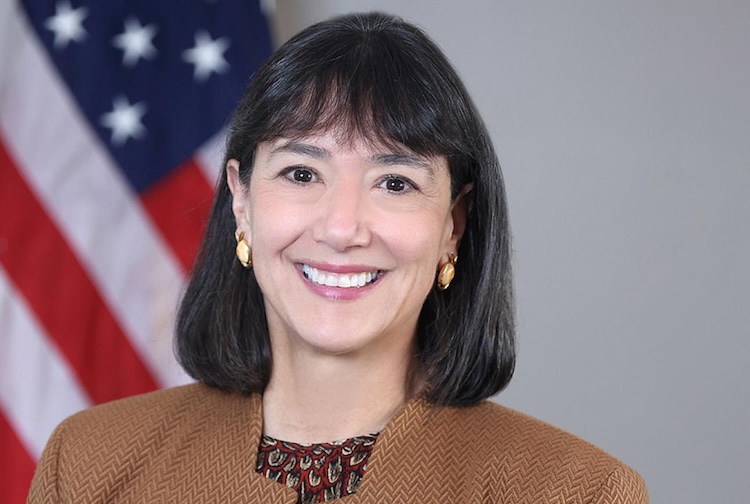
New lung cancer screening guidelines: Massey experts weigh in
Revised U.S. Preventive Services Task Force recommendations will double the number of Americans eligible for low-dose CT lung scans and improve survival for high-risk groups.
March 26, 2021 Mark Parker, M.D., FACR, director of the Early Detection Lung Cancer Screening Program at Massey, and VCU Health radiologist Leila Rezai Gharai, M.D., review a patient's lung CT scan. (Photo: John Wallace, VCU Massey Cancer Center)
Mark Parker, M.D., FACR, director of the Early Detection Lung Cancer Screening Program at Massey, and VCU Health radiologist Leila Rezai Gharai, M.D., review a patient's lung CT scan. (Photo: John Wallace, VCU Massey Cancer Center)
The U.S. Preventive Services Task Force has issued new recommendations that double the number of Americans eligible for annual low-dose CT lung scans. The revised guidelines lower the eligibility age to 50 from the original 55-years of age. They also reduce the number of pack-years of cigarette smoking to 20 (the equivalent of 1-pack per day for 20-years), from the original 30-pack-years for current smokers and those who have quit within the past 15 years.
The new recommendations increase the number of Americans eligible to 16 million from 8 million. Experts predict more widespread screening for lung cancer could save as many as 30,000-60,000 lives per year in the United States.
The USPSTF’s new recommendations, published March 9 in the Journal of the American Medical Association, will expand screening access to populations at the greatest risk, said Alex Krist, M.D., a professor in the Department of Family Medicine and Population Health at VCU School of Medicine, and Cancer Prevention and Control researcher at VCU Massey Cancer Center.
“By lowering the age to 50 years and the pack years to 20 to start screening, more people are now eligible for lung cancer screening, which will save lives,” said Krist, who serves as chair of the U.S. Preventive Services Task Force and corresponding author on the recommendations. “This is particularly important for Black men, who have a greater risk of dying from lung cancer and who get lung cancer at a younger age and with less pack years of smoking. This change has the potential to improve health equity.”
The recommendations were published alongside an evidence report providing an extensive analysis of 223 publications and seven randomized clinical trials. The report concluded that screening at age 50 reduced lung cancer mortality, but it also noted that increased screenings may lead to an increase in incidental findings and the potential for overtreatment. The USPSTF emphasized a shared decision-making process between patients and their doctors to determine if screening is the right choice.
Patrick Nana-Sinkam, M.D., chair of the Division of Pulmonary Disease and Critical Care Medicine at VCU School of Medicine and pulmonologist and Cancer Prevention and Control research program member at Massey Cancer Center, led the establishment of Massey’s Early Detection Lung Cancer Screening Clinic.
“We recognize that assessing lung cancer risk is complex. Thus, we conduct an evaluation in which we discuss personal cancer risk versus the risks and benefits of proceeding with screening,” he said. Nana-Sinkam engages in this shared decision-making process with patients every Wednesday in the screening clinic and recently participated in a VCU Health podcast on the topic. “We believe that CT screening and reviewing results in real time, coupled with tobacco cessation counseling and the opportunity for enrollment in clinical biomarker studies, results in the most comprehensive assessment for our patients.”
The new recommendations received a B rating, meaning the USPSTF expects it to provide a “moderate net benefit” for those at increased risk. Most insurers are required to cover services that receive an A or B rating without a copay within one year of the publication date. Plans may voluntarily cover this new population in the interim.
“If the new Task Force recommendations are implemented across our country, this cost-effective test will save more lives than any cancer screening test thus far in history. I would like to encourage anyone who meets these new eligibility criteria to talk with their doctor about getting screened,” said Mark Parker, M.D., FACR, radiologist and director of Massey’s Early Detection Lung Cancer Screening Program. “The screening CT scan itself is safe and takes less than 10 seconds to perform, and the benefits of finding lung cancer early cannot be understated.”
To learn more about Massey’s Lung Cancer Screening Program or to schedule an appointment, please call (804) 827-LUNG.



